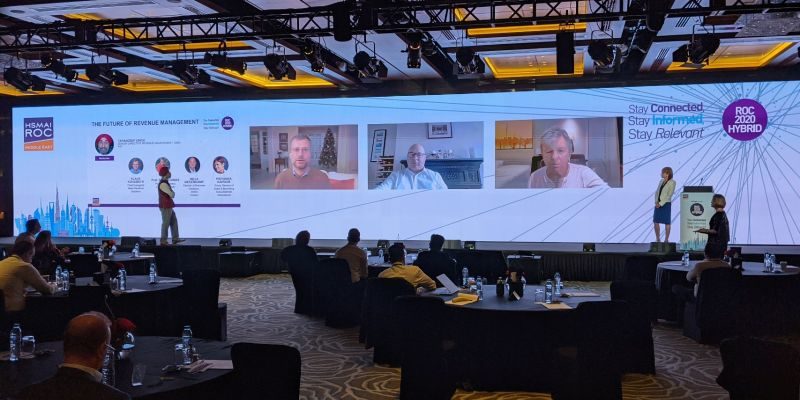By Kaitlin Dunn, Writer, Hospitality Sales & Marketing International (HSMAI)
HSMAI Middle East recently hosted ROC Middle East, a one-day hybrid event that included both in-person and virtual attendees. During the closing program, “That’s a Wrap,” Kempinski Hotels’ Amanda Elder and JA Resorts & Hotels’ Thomas Grundner joined the Dubai College of Tourism’s Jeff Strachan to give an overview of the day and take questions from the audience. Here are takeaways from their discussion.
REAL CHANGE
Many companies have talked about investing more in technology and reexamining job functions, but have any of them actually changed? Elder, Kempinski’s senior vice president for business development, thinks that there are a lot of good reasons why some companies haven’t yet made any major switches.
“A small company may not have the funds to invest right now,” she said. “And a larger company may have more funds, but the organization may be so large that it’s just not practical. I always say that if there is an empty space in front of you, you should step into it. There will be some companies that do and some that don’t. We can already see those who have embraced change and are moving forward in a different way, and those that haven’t.”
Grundner, JA Resorts & Hotels’ vice president of sales and marketing, shared his own experience with introducing changes to the company. “We canceled the key revenue management tool at the beginning of the year because we wanted to explore what else is in the market,” Grundner said. “We are much nimbler. The COVID period has given us the chance to question if our moves are the right moves. Every leader needs to make the decisions on how to operate for their company. We’ve had a fantastic leadership team, but I think questioning the processes and not taking things for granted is important.”
ACTIONABLE DECISIONS
In keynote presentations earlier in the day, information was provided about data available to hoteliers. Strachan, Dubai College of Tourism’s director, asked panelists how people on-property can use that data to make actionable decisions.
Grundner strongly encouraged managers to stop requiring their teams to put reports together. “The time it takes to pull them together can be better used, because all of us can already see the data,” he said. “We don’t do monthly reports anymore. It’s all data available to us, and that frees times for revenue management, sales, and marketing to focus on their key jobs. You look at the report for two minutes but spend half a day putting it together. Remove that and focus the team on what they’ve been hired for.”
Elder said that companies must start embracing revenue leaders as business leaders instead of writing them off because they may be quieter and more analytical than their more boisterous counterparts in sales or marketing. “They need to be given the opportunity to speak,” she said.
ADAPTING TO NOW
An attendee asked the panelists what from the owners’ perspective will be done to save their profitability and adapt to the next few years. “The only people who are going to fix this are the talents,” Strachan said. “Are we doing enough to invest in talent? We’re the ones who have to take responsibility to invest in and cultivate the talent to counter these issues.”
Elder added: “We never invest enough in talent. For me, it should be infinite.”
Grundner said that it is important to protect owners’ assets, as his company has done. “We’ve made very uncomfortable decisions to protect the owner’s assets, but if we didn’t do that, we wouldn’t be here anymore,” he said. “As long as the owners have trust in us, they will buy in to us”
COLLABORATION INTO THE FUTURE
Another attendee asked panelists if they think that the collaboration seen between hoteliers during the COVID crisis will last for the next few years, and how to encourage hotels to find the right employees for newly created jobs. “I don’t know if there’s an immediate answer, but I think it’s all about education,” Elder said. “We have to continue to educate those who don’t want to be educated. We need to have an expectation that they tune into events like this.”
Grundner said that he thinks the era of collaboration likely will end when competition comes back. “Everyone will fall back into their comfort zone,” he said. “I remember sitting here 10 to 15 years ago, we had a conversation about joint activities and were able to direct the markets and there was unity, but it’s grown too much and there are too many stakeholders to get everyone aligned.”
Elder said that she has seen collaboration work well for Hong Kong and in her personal experience. “They got into one room and decided on a way forward for the destination,” she said. “I started a weekly call with commercial leaders, then it evolved into best practices, and GMs, finance directors, and others started dialing in, and we went from 250 to 450 people. It’s back down to 300, but people want to keep doing it.”
